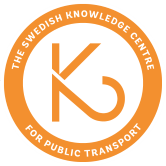Article highlighted
Socially sustainable accessibility, a new anthology

We know that public transport both reflects and reinforces tensions and inequalities between different groups in society. The objective of social sustainability has a long history, but as a concept in terms of social sustainable accessibility it is, however, relatively new in the transport subject area in Sweden.
− There is an outspoken need of knowledge about the impact of social perspectives on the transport system and how it is practically converted into arrangements that will apply for all travellers, says K2 researcher Christina Lindkvist, one of the editors of the new anthology.
Transport planning focusing on high-demand routes and high speed tends to benefit comparably well-to-do travellers with good mobility resources. On the other hand, travellers that are less resourceful and depending on commuting at odd hours, non-standard commuter lines and longer routes, often spend more time on buses and trains at the expense of time with social obligations, family, friends and leisure.
The COVID-19 pandemia has uncovered the vulnerability in being dependent on public transport. Both drivers and commuters are exposed to the infection as they have no choice but to squeeze into crowded buses and trains.
The main theme of the new anthology concerns the interpretations and concrete mobility strategies of different individuals and social groups. It investigates restrictions they are exposed to in public transport, and strategies they adopt. Their experiences are seldom mirrored in social sustainable policies.
− It is an important task, for researchers as well as for planners, to develop methods that contribute to achieve the political goals of social sustainability. The traditional transport planning needs to be supplemented with knowledge considering how the transport system affects different social groups, says Malin Henriksson, also K2 researcher and the second editor of the anthology.
The anthology ”Kollektiva resor, utmaningar för socialt hållbar tillgänglighet” (Arkiv, 2020) is available in Swedish.
Contact, editors
Christina Lindkvist, researcher at Malmö University
E-mail: Christina.Lindkvist@mau.se
Malin Henriksson, researcher at The Swedish Road and Transport Research Institute, VTI
E-mail: Malin.Henriksson@vti.se
